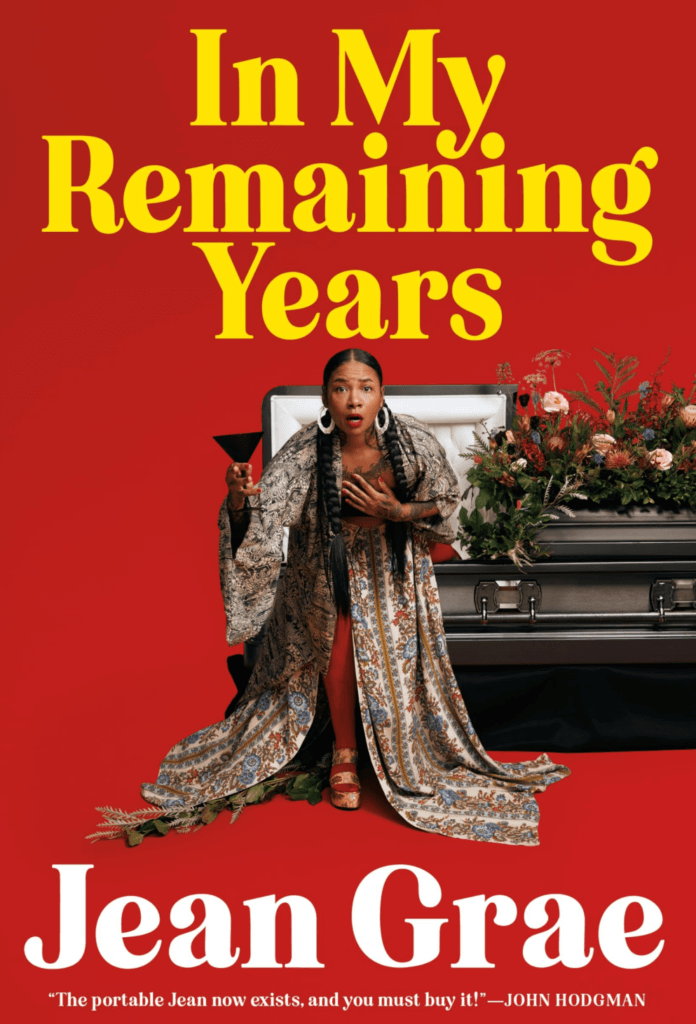
Photography by Mindy Tucker
‘In My Remaining Years’ Is the Gift We Didn’t Know We Were Still Allowed to Receive. Jean Grae left rap, but she never left us. And now she’s written a book that reminds us why we needed her so badly in the first place.
Before I dive in, let me tell you something. The first thing I ever wrote — or at least the first thing I ever grandly declared to the universe with the trembling audacity of a new “writer” — was a review of Jean Grae’s Gotham Down — Cycle 1. And yes, calling myself “a writer” at the time was laughable. Pretentious. Probably typed in Courier New while sipping green tea and listening to ambient rain sounds on YouTube. But hey, we’ve all got to start somewhere — and if you’re going to start anywhere, let it be the work of one of the most brilliant, under-celebrated, bar-dismantling, genre-transcending minds hip hop has ever known. Even if doing so is like trying to sketch the Sistine Chapel with a crayon.
So, yes. Jean Grae will always have a special place in my heart. And when she stepped away from rap’s frontlines, it felt like the kind of cultural loss you don’t realise has happened until you wake up and nothing sounds quite as sharp anymore.
But here’s the thing: she never stopped creating. While we were busy grieving the emcee, Jean Grae was out here making entire worlds. Writing, directing, performing theatre, building multimedia events, and casually being funnier than most comedians alive. Always three creative lifetimes ahead, quietly rejecting every box we tried to place her in.
And now comes In My Remaining Years. A book. A miracle. A multi-dimensional stream of consciousness dressed as a memoir, dipped in sci-fi, and rolled in heartbreak, humour, and existential funk. For someone with ADHD (hi, yes), actually reading a book is a small miracle in itself. But thank the creative gods for the audiobook, which isn’t just a reading — it’s a performance. A journey. A sonic constellation of words, sighs, whispers, punches, and perfectly placed silence. If this doesn’t get nominated for a Spoken Word Grammy, we march at dawn. (Though, let’s be honest — Jean probably wouldn’t care about a Grammy. Would she? Maybe? I don’t know)
The book itself? Searing. Surreal. Stupidly smart. There are Marvel references dropped with zero fanfare, like they’re less pop culture namechecks and more spiritual signposts. Jean doesn’t just nod to the multiverse — she lives in it. She’s Deadpool with a degree in metaphysics. Doctor Strange with sharper syntax. The way she writes about identity, love, grief, survival, rage — it’s not just honest, it’s agonisingly human. It’s raw but never self-indulgent, confessional without ever asking for pity.
She describes herself as “gender transcendental” — the most Jean thing imaginable — a phrase that sounds like it was coined by both Kierkegaard and your weirdly profound group chat. But beyond the term is a deeper truth: Jean has always existed outside of binaries. Not just in gender or genre, but in tone. In emotion. In time. She’ll give you an entire paragraph about spiritual annihilation, then undercut it with a joke so bone-dry it should be served with a whiskey chaser.
And here’s the kicker: you don’t need to “relate” to any of it to feel seen by all of it. There were moments in this book where I had no cultural or personal frame of reference for what Jean was talking about — and still, I was absolutely wrecked. That’s what happens when someone tells their truth, not just a truth. There is no algorithm for that kind of writing. No carousel post. No quote-tweet aesthetic. Just real, unfiltered, terrifying honesty — the kind that’s practically extinct in the influencer economy of “relatable content.”
Reading — or more accurately, experiencing — this book feels like Jean’s most powerful act yet. She’s not just telling us who she is. She’s showing us what it means to be unapologetically complex in a culture that wants everyone easy to market and even easier to forget. The vulnerability is surgical. The humour is gallows-level. The fantasy elements — weird, wild, time-travel-adjacent — somehow don’t detach you from the emotion; they heighten it. It’s like Octavia Butler got drunk with Hannah Gadsby and made a scrapbook about the apocalypse, except make it tender.
And while we’re here: give Jean Grae her long overdue flowers, immediately. For the music. For the words. For the entire canon of being Jean Grae. There has never been — and likely never will be — another artist who can dance between worlds with this much grace, rage, elegance and bloody-minded wit.
So yes, I once “became a writer” by reviewing Jean’s music. But it feels laughable now, writing about one of the greatest writers of a generation — someone whose pen bleeds truth in iambic footnotes, who could annihilate a soul in four syllables and heal it again in five.
In My Remaining Years is a gift— artistic, sonic, spiritual — we’ll look back at this book as a time capsule of what it meant to be truly awake, alive, and unmarketably authentic in the age of algorithmic rot.
So if you’re listening, reading, feeling:
Protect Mx. Jean Grae. AT ALL COSTS.
In My Remaining Years is Out Now.

Micky Roots
Latest posts by Micky Roots (see all)
- SINEAD O’CONNOR, THE REBEL HEART THAT BEAT IN HIP-HOP TIME — August 19, 2025
- TRUE TO THE GAME: WHY AMY TRUE IS THE ARTIST WE NEED — July 11, 2025
- REVIEW | GHETTS AT SOUTHBANK CENTRE, MASTERY IN MOTION — June 26, 2025
